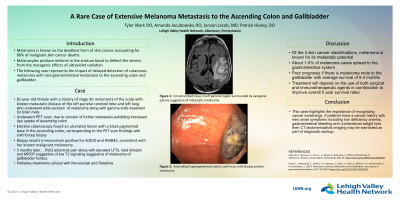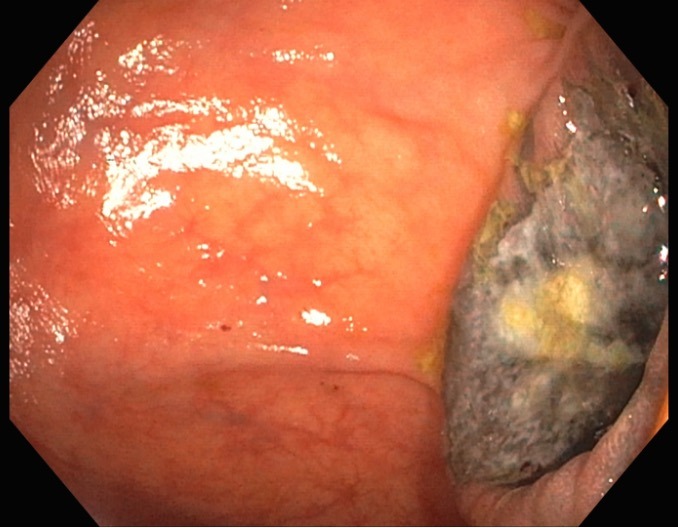Tuesday Poster Session
Category: Colon
P3692 - A Rare Case of Extensive Melanoma Metastasis to the Ascending Colon and Gallbladder
Tuesday, October 29, 2024
10:30 AM - 4:00 PM ET
Location: Exhibit Hall E

Has Audio
- TW
Tyler Wark, DO
Lehigh Valley Health Network
Macungie, PA
Presenting Author(s)
Tyler Wark, DO1, Amanda Jacubowsky, DO2, Janson Jacob, MD2, Patrick Hickey, DO3
1Lehigh Valley Health Network, Macungie, PA; 2Lehigh Valley Health Network, Allentown, PA; 3EPGI, Allentown, PA
Introduction: Melanoma is known as the deadliest form of skin cancer, accounting for 80% of malignant skin cancer deaths. Melanocytes produce melanin in the stratum basal to defend the dermis from the mutagenic effects of ultraviolet radiation. Without proper skin protection, the accumulative effects of the sun can lead to the development of skin cancers. The following case represents the impact of delayed detection of cutaneous melanoma with rare gastrointestinal metastasis to the ascending colon and gallbladder.
Case Description/Methods: We present an 81-year-old female with a history of stage IIIc melanoma of the scalp with known metastatic disease of the left parietal cerebral lobe and left lung. She underwent a wide excision of her cutaneous malignant lesion and subsequent gamma knife treatment for her brain metastasis. Her outpatient oncologist started her on Pembrolizumab for one year of therapy. With concern for further metastasis, she received a PET scan exhibiting increased dye uptake in the ascending colon. Further investigation with an elective colonoscopy found an ulcerated lesion with a black pigmented base in the ascending colon, corresponding to the PET scan findings. Cold forcep biopsies were taken with difficulty due to the lesion’s firm nature. Pathology immunostains were positive for SOX10 and HMB45, consistent with her known malignant melanoma. Three months later, she developed right upper quadrant abdominal pain. Her labs revealed mildly elevated liver function testing including AST 158 U/L, ALT 95 U/L, total bilirubin 1.1 mg/dL, and alkaline phosphatase 130 U/L. She had an MRCP which exhibited low T2 signaling in the gallbladder fundus, concerning for further metastatic melanoma. After shared decision-making with her oncology team, the patient pursued palliative treatment with Nivolumab and Relatlima.
Discussion: Melanoma has a yearly incidence of 22 per 100,000 people in the United States. It spreads to the gastrointestinal system in only 1-5% of total cases. The prognosis is poor for metastatic gallbladder melanoma with an average survival of 8.4 months and a 5-year survival of 15%. Studies suggested that treatment with surgical and immunotherapeutic agents increases the 5-year survival of metastatic melanoma to 52%. This case emphasizes the importance of recognizing new-onset gastrointestinal symptoms including abdominal pain, gastrointestinal bleeding, iron deficiency anemia, and unintentional weight loss to allow for appropriate metastatic screening.

Disclosures:
Tyler Wark, DO1, Amanda Jacubowsky, DO2, Janson Jacob, MD2, Patrick Hickey, DO3. P3692 - A Rare Case of Extensive Melanoma Metastasis to the Ascending Colon and Gallbladder, ACG 2024 Annual Scientific Meeting Abstracts. Philadelphia, PA: American College of Gastroenterology.
1Lehigh Valley Health Network, Macungie, PA; 2Lehigh Valley Health Network, Allentown, PA; 3EPGI, Allentown, PA
Introduction: Melanoma is known as the deadliest form of skin cancer, accounting for 80% of malignant skin cancer deaths. Melanocytes produce melanin in the stratum basal to defend the dermis from the mutagenic effects of ultraviolet radiation. Without proper skin protection, the accumulative effects of the sun can lead to the development of skin cancers. The following case represents the impact of delayed detection of cutaneous melanoma with rare gastrointestinal metastasis to the ascending colon and gallbladder.
Case Description/Methods: We present an 81-year-old female with a history of stage IIIc melanoma of the scalp with known metastatic disease of the left parietal cerebral lobe and left lung. She underwent a wide excision of her cutaneous malignant lesion and subsequent gamma knife treatment for her brain metastasis. Her outpatient oncologist started her on Pembrolizumab for one year of therapy. With concern for further metastasis, she received a PET scan exhibiting increased dye uptake in the ascending colon. Further investigation with an elective colonoscopy found an ulcerated lesion with a black pigmented base in the ascending colon, corresponding to the PET scan findings. Cold forcep biopsies were taken with difficulty due to the lesion’s firm nature. Pathology immunostains were positive for SOX10 and HMB45, consistent with her known malignant melanoma. Three months later, she developed right upper quadrant abdominal pain. Her labs revealed mildly elevated liver function testing including AST 158 U/L, ALT 95 U/L, total bilirubin 1.1 mg/dL, and alkaline phosphatase 130 U/L. She had an MRCP which exhibited low T2 signaling in the gallbladder fundus, concerning for further metastatic melanoma. After shared decision-making with her oncology team, the patient pursued palliative treatment with Nivolumab and Relatlima.
Discussion: Melanoma has a yearly incidence of 22 per 100,000 people in the United States. It spreads to the gastrointestinal system in only 1-5% of total cases. The prognosis is poor for metastatic gallbladder melanoma with an average survival of 8.4 months and a 5-year survival of 15%. Studies suggested that treatment with surgical and immunotherapeutic agents increases the 5-year survival of metastatic melanoma to 52%. This case emphasizes the importance of recognizing new-onset gastrointestinal symptoms including abdominal pain, gastrointestinal bleeding, iron deficiency anemia, and unintentional weight loss to allow for appropriate metastatic screening.

Figure: metastatic melanoma of the ascending colon
Disclosures:
Tyler Wark indicated no relevant financial relationships.
Amanda Jacubowsky indicated no relevant financial relationships.
Janson Jacob indicated no relevant financial relationships.
Patrick Hickey indicated no relevant financial relationships.
Tyler Wark, DO1, Amanda Jacubowsky, DO2, Janson Jacob, MD2, Patrick Hickey, DO3. P3692 - A Rare Case of Extensive Melanoma Metastasis to the Ascending Colon and Gallbladder, ACG 2024 Annual Scientific Meeting Abstracts. Philadelphia, PA: American College of Gastroenterology.
